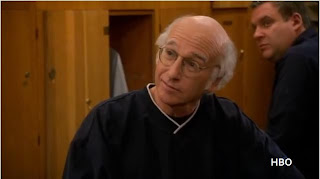"Tampering with an automobile's exhaust is a felony." -- Sue Sylvester
Image: Wikimedia Commons
The ever-litigious Sue Sylvester made a few enemies on last week's episode of Glee, "The Substitute." This episode explores what Glee club would be like without Mr. Schuster and also gives us a good excuse to discuss the intentional tort of trespass to chattels. (Not that we even need an excuse - I mean chattels is such a fun word to say!)
While filling in for the flu-afflicted principal, Sue takes a stand on healthy teen lunches and bans tater tots from the school cafeteria. This leads to a riot a McKinley High and no one is more bothered than Mercedes Jones. Mercedes responds by stuffing tater tots into Sue's tailpipe and soon finds herself in Principal Sylvester's office. Sue informs her that the tots caused $17,000 worth of damage to her 1979 "LeCar," a "rare and desirable automobile . . . prized by collectors for its peerless grace among vintage European sportscars." It is one of seven of its kind in existence and Sue had trouble finding a mechanic that had even heard of the "LeCar."
Sue's LeCar is "personal chattel," defined by Black's law dictionary as a moveable item that "is not attached to or has no connection with land." The tort of trespass to chattels requires that the plaintiff establish: (1) an act by defendant that interferes with plaintiff's right of possession in a chattel, (2) intent, (3) causation, and (4) damages. She has an open and shut case: the stuffing of the tater tots into the exhaust pipe constitutes an act interfering with Sue's use of the car, Mercedes had the requisite intent ("I told her not to touch my tots"), and the tots caused $17,000 worth of damage.
Sue might also consider basing a lawsuit on the tort of conversion. The main difference between the two torts is that conversion requires an interference with the right to the chattel that is so serious, it warrants requiring defendant to pay the chattel's full value. I was unable to track down the precise Kelley Blue Book value for a 1979 LeCar, but conversion might be a better option given the rarity of the automobile and the difficulty of finding compatible parts and a knowledgeable mechanic.
However, Sue seems much more concerned with justice than with getting compensated for the damage to her vehicle. She threatens Mercedes that tampering with an automobile's exhaust is a felony in the State of Ohio and that she will be pressing charges. Although Ohio's criminal code does not specifically prohibit tampering with exhaust pipes, this activity might fall under either the statute for Vandalism or Criminal Mischief. Criminal mischief requires that the defendant "knowingly move, deface, damage, destroy, or otherwise improperly tamper with the property of another," but this conduct is only a misdemeanor. Under the vandalism statute, however, $17,000 worth of damage to property would constitute a fourth degree felony, but only if the jury concluded that Sue's LeCar was "necessary in order for its owner or possessor to engage in the owner’s or possessor’s profession, business, trade, or occupation." The Ohio Supreme Court recently upheld a jury verdict on this very issue where the damaged car was the victim's only means of performing her job as a self-employed health care assistant, which involved picking up groceries and prescriptions for various patients. Whether this would extend to mere use as a mode of transportation to and from McKinley High School is unclear.
Luckily, Mercedes isn't too fazed about the possibility of jail time. "You know what they have in prison . . . tots!"





















